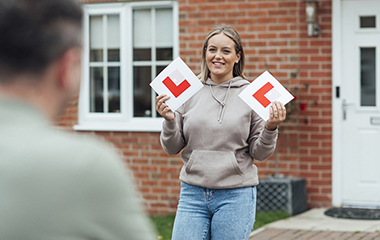How to choose a good driving instructor?
- Editorial Team
One of the most important steps when learning to drive is to choose a driving instructor who can teach you to drive safely and responsibly. Your driving instructor will help you prepare for your driving test and beyond when you’re ready to drive alone after you pass your test.
The DVSA recommends around 45 hours of professional driving lessons and a further 22 hours of private practice to learn to drive.
Who can teach you to drive?
There are several ways that you can learn to drive. You can pay for driving lessons with a driving instructor, or you can practice with family or friends under certain conditions.
If you’re paying for driving lessons, the instructor must be either a qualified and approved driving instructor (ADI), or a trainee driving instructor (PDI). The instructor should display a badge in the windscreen of their car to prove they’re registered with the Driver and Vehicle Standards Agency (DVSA).
The driving instructor should display a green badge if they are a qualified driving instructor, or a pink badge if they are a trainee driving instructor.
Learner drivers can only take motorway driving lessons with an approved driving instructor in a car fitted with dual controls.
A trainee driving instructor may start charging for driving lessons once they’ve completed the first two parts of the Approved Driving Instructor test. Although a trainee driving instructor is not fully qualified and may lack some experience, they will have fresh knowledge and are less likely to have picked up bad habits.
Approved driving instructors may work independently or with a driving school.
Speak to friends and family for recommendations
One of the most effective ways to find a good driving instructor is to ask for recommendations. You could speak to close family and friends or reach out to your network on social media.
You can also read reviews online. Facebook, Google and Trustpilot are popular channels to read reviews online. Try to focus on the comments than the ratings, as this may provide some valuable insight into the driving instructor’s teaching style and whether they’re a good fit.
If there are negative reviews, look for patterns in the comments. For example, common criticisms about a specific aspect of their work. Also, look at the dates the reviews are posted. If they have a negative review, quickly followed by a run of positive reviews, it could be that the instructor has reached out to friends and family members for positive reviews to flush out the bad ones.
But be wary of reviews that are posted on the driving instructor’s or driving school’s website, as anyone can write them, and they may not be genuine.
Patience
It’s inevitable that learner drivers will make mistakes while learning to drive. A good driving instructor should be patient, understanding and give you plenty of encouragement. The last thing you need is someone who shouts every time you make a mistake, as this can affect your confidence and hinder your progress.
Reliability
A learner driver’s time is invaluable, which is why it’s important that their driving instructor is organised and punctual. If the driving instructor arrives late, cuts lessons short, cancels lessons or even fails to turn up, this can really hold the learner driver back.
If the driving lessons are through a driving school, are they providing a substitute instructor if your normal instructor is unavailable?
While some circumstances may be unavoidable, if this happens on a regular basis, it may be best to find an instructor that is more reliable.
Professionalism
The driving instructor should always conduct themselves in a professional manner with clients. They should be dressed suitably and not use inappropriate language during lessons.
They should be giving you their full attention and not using their mobile phone to text or call other customers during lessons.
Driving lessons should be one to one and not shared with other students, a practice referred to as ‘piggybacking’.
Flexibility
A good driving instructor should provide a flexible pick up and drop off service, from your home, work, or place of study.
You’ll also want to consider the instructor’s availability. The more you can practice, the better you’ll become. Through regular driving lessons, the new skills you’ve developed will be fresher in your mind and driving will become easier and more automatic.
The vehicle you’ll be learning to drive in
Whether you use your driving instructor’s car or your own car when learning to drive, it must be safe and roadworthy.
If you’re taking lessons in your driving instructor’s car, it is essential that the car is reliable, easy to drive and control. It should also be well-maintained and clean.
You should also check whether you’ll be using the same vehicle each lesson. This will improve your chances of passing the test because you will become more familiar with the controls and how the vehicle drives.
If you want to learn to drive on UK motorways, you must be accompanied by an approved driving instructor in a car with dual controls.
Your height may also be a factor as you will want to learn in a car you can drive comfortably in. If you’re tall, you probably don’t want to be learning to drive in a small car, such as a mini. On the other hand, if you’re short, you’ll want to be practising in a car where you can easily reach the pedals.
Are you learning to drive in a new car or an old car and how will this affect your driving experience?
You’ll also need to think about the type of car you will be practising in, compared to the car you’ll be driving when you pass your test.
A teaching style that suits you
A driving instructor should adapt their training to suit your needs. They should provide regular feedback during the lessons about any areas you need to improve and help you understand what you could be doing differently. They should keep you motivated and engaged and how to get the best out of you.
Should you check the driving instructors’ pass rates?
The pass rate of a driving instructor is not necessarily a reflection of their teaching standard. A learner driver can be well prepared for the test but fail because their nerves get the better of them on the day.
Some driving instructors may have lower pass rates because they specialise in dealing with nervous or anxious drivers, or those that have difficulties when learning to drive.
Another issue with pass rates is that they don’t tell you how many attempts were needed to pass, but instead whether the learner simply passed or failed the test.
Furthermore, a driving instructor that has put many candidates forward for their test may have a lower average pass rate than an instructor who has put fewer candidates forward. For example, an instructor can claim to have a 100% pass rate but only have one or two students.
Then there are some instructors that hold candidates back to protect their pass rates, resulting in candidates taking more lessons than is often necessary.
Simply because a driving instructor has a high pass rate, doesn’t necessarily mean that their teaching style will suit you. That said, if you want to factor in pass rates when choosing an instructor, a 55% pass rate is a reasonable benchmark to consider.
Don’t limit yourself to the cheapest instructor
Besides the price, there are many factors to consider when choosing a driver instructor, so you shouldn’t jump in to choose the cheapest instructor without carefully considering all the options.
While it may be cost-effective to buy your driving lessons in bulk, you may want to consider booking one or two single lessons with the instructor first. This allows you to evaluate your relationship with the instructor and whether you feel confident you can achieve your learning goals working with them.
Are you making progress?
Driving should be enjoyable, and you should be feeling motivated and engaged to learn to drive.
There should be a clear and structured lesson plan in place between you and your instructor that manages your progress, ensures your time is being used effectively and identifies further training requirements. Your instructor should be able to adapt the lesson plan depending on your progress.
Sometimes changing your driving instructor may be beneficial, particularly if you feel that your progress is slower than expected. But continuity is important. You don’t want to keep switching instructors.
What should I ask my driving instructor?
- Are they fully qualified?
- Do they offer a flexible pick up and drop off service?
- How many lessons on average do their students have before they take their practical driving test?
- Does the instructor provide motorway driving lessons?
- How familiar are they with the local area and driving test routes?
- How long will each driving lesson last?
- Will you be learning to drive with the same instructor?
- Will you be learning to drive in the same car?
- What is the standard price of their driving lessons?
- Do they have any special offers on lessons?
- How many hours of professional driving lessons do they recommend each week?
Will I need car insurance as a learner?
If you’re learning to drive with a qualified driving instructor, they will already have an insurance policy in place on the vehicle you’re practising in.
However, if you’re taking private driving lessons, you may need an additional insurance policy in place on the vehicle you intend to practice in.
At A Choice, we specialise in providing learner driver insurance. So, whether you intend to learn in your own car or in someone else’s, we can help.
Final thoughts
It’s vital that you choose the right instructor to ensure you can drive safely and responsibly. You can find an approved driving instructor online on GOV.UK.
Learn more
Share this article
Table of Contents
More posts

SORN A Vehicle: Should you declare your car off the road | A Choice

Can You Take Your Driving Test In Your Own Car | A Choice

What To Do After A Car Accident | A Choice

